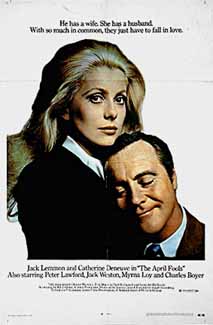
THE APRIL FOOLS
US, 1969, 95 minutes, Colour.
Jack Lemmon, Catherine Deneuve, Myrna Loy, Charles Boyer, Peter Lawford, Jack Weston,. Harvey Korman, Sally Kellerman.
Directed by Stuart Rosenberg.
The April Fools is a glossy superficial style romantic comedy. It echoes the late '60s,when it was made, in its picture of society and its critique of the family, marriage, romance? It is a Jack Lemmon vehicle and her brings his usual style to it - although he has played the role in so many films from The Apartment to Under The Yum Yum Tree, Good Neighbor Sam etc. Catherine Deneuve is an attractive looking heroine but seems somewhat out of place in this style of film. There is an interesting range of supporting cast with Myrna Loy eccentrically graceful as an astrologist and Charles Boyer as an ageing enthusiast of fencing. Harvey Korman has a comedy role and Sally Kellerman appears in an early role as Jack Lemmon's wife. There is a well known song by Burt Bacharach and Hal David which is sung by Dione Warwick and the rest of the music is by Marvin Hamlisch. Direction is by Stuart Rosenberg who made such interesting films as Cool Hand Luke and Pocket Money as well as quite a lot of uneven thrillers and westerns.
1. The appeal of this kind of romantic comedy? It being the staple in films from the '30s to the present? The nature of the perennial appeal of marriage, romance? The significance of the title? The fairy tale about the princess and the frog and its adaptation to an American wish-fulfilment situation?
2. The conventions of this kind of romantic comedy - the shy hero and the prospect of success and advancement, the unsympathetic wife, the family and his loyalties? The attractive and exotic romantic figure and the possibility of her being the princess to kiss and transform the frog? The business background with its stylish parties? The commuters on the train and their drinking and dream of different things? The decision to change one's life? How well were they handled here?
3. The use of Panavision, location photography? Affluence in sets, decor, costume? The modern aspects with the part and the apartments? Brubaker's house and his wife's changing styles? The Greenlaws and their castle and its many rooms? The contribution of the score and especially the theme song and its constant use?
4. How plausible was the plot meant to be? Sufficient for the purposes of the film? The hero and his business situation and advancement, the brittle marriage? Catherine and her formal marriage to Ted Gunther? Gunther and his double values? Howard Brubaker and his friends? The crisis in his life.. the influence of the Greenlaws, his sudden wild decision and his following it through?
5. Jack Lemmon's comedy style and timing in this kind of role? An American hero - easily identifiable with? The opening with Potter Shrader, his going to the party and his awkwardness, the relationship with Catherine and going out with her dancing? The Greenlaws and Grace telling his fortune, Andre and the duelling? The growing infatuation with Catherine? The story of the frog and the princess? The continual phone calls to Phyllis and her suddenly ending them? His relationship with Gunther and his following his advice to go to the hotel? His decision to throw in his job, the pursuit of Catherine? The irony of discovering who she was? The confrontation with Gunther? Going how to Phyllis with his drunken friends. almost missing the plane and her not seeming to care? The happy ending? Did he have a future with Catherine?
6. Catherine and her glamour, her presence at the party, her willingness to go off with Howard, her relationship with Ted? Enjoying the outing, the dancing? The talk with Grace? Her going home and decision to leave Ted, going to the sports stadium to tell him? The finale on the plane? Was she matched to Howard?
7. The contrast of Ted Gunther and his business style, permissive morals, go getting, ignoring of his wife? Phyllis and her decorating houses, entertaining friends and ignoring her husband? The children?
8. The contribution of the Greenlaws in their eccentricity - Grace as a kind of fairy godmother foretelling the future? Andre as an old-fashioned prince? The contribution of Benson and Shrader with their advice, their drinking, their talking about women on the way home? The Hopkins couple and their listening to Howard and their advice?
9. The long amount of time spent on the party and creating its atmosphere, the nightclubs and the dancing, the visit to the Greenlaws and the fencing, Howard's return to the hotel and discovery of the truth about Catherine, his confrontation in the office with Gunther, the ride how on the train, Phyllis at the mad rush to the airport? Their place in the plot, their pacing, atmosphere, comedy touches?
10. The significance of the title and its comment on the central characters? Thews of marriage in modern society? The fairytale hopes of a new beginning and a transformation in middle age? How true is this, how untrue? The importance of people acting on these experiences or not?